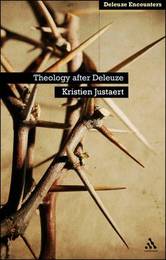
|
Theology After Deleuze
Hardback
Main Details
Description
Deleuze's relationship with theology is a complex one. Indeed, there seem to be many possible objections to such an 'assemblage' taking place. In the first book of its kind to engage with this seemingly problematic dialogue, Kristien Justaert shows the ways in which Deleuze's thought can in fact advance issues in political and liberation theology in particular, while also exploring the important theological and spiritual aspirations contained in Deleuze's philosophy itself, as part of his lifelong quest for the 'Absolute'. Justaert examines the theological components in Deleuze's writings, investigating the theological potential of four notions that circle around the central Deleuzian concept of 'Life': immanence, spirituality, creativity and politics. The book goes on to connect Deleuze with both established theologies and possible theologies for the future, identifying areas in which Deleuze can contribute to the dynamics of contemporary theology, and argues that aspects of Deleuze's philosophy can enable theology to become more meaningful in a globalised world. This is the ideal introduction to Deleuzian theologies, and Deleuze's own theology, for advanced undergraduate and postgraduate students.
Author Biography
Kristien Justaert is a Postdoctoral Researcher at the Catholic University of Leuven, Belgium.
Reviews'Deleuze professed to be looking for a form beyond God and Man. Despite this, the writings of Deleuze and Guattari are full of resonances for the theological thinker. These resonances are at once suggestive and problematic, and Justaert captures them in all their amplitude in an excellent work which brings many insights to the thought of Deleuze and Guattari.' -- Kenneth Surin, Professor of Literature and Professor of Religion and Critical Theory, Duke University, USA 'The mutual interaction proposed by Kristien Justaert between some major theological issues and the key features of Gilles Deleuze's thought proves very fruitful for the unfolding of a philosophical framework urgently needed in the field of liberation theologies. She illustrates convincingly how faithfulness to real life in its creative action amidst the possibilities it harbours opens spaces for ethical and political commitment in ever renewed community building at all levels of reality. These perspectives allow liberation theologians to rejuvenate their thought and action amidst today's major global challenges.' -- Jacques Haers, Professor of Theology at Katholieke Universiteit Leuven and Academic Director of UCSIA in Antwerp, Belgium 'The book is striking for its even-handed and open-ended approach to both Deleuze and to theology, sensitive to the complex nature of spiritual categories in Deleuze's thought as well as to the intricate ways theological thought and practice have been constructed and contested in history. A provocative and compelling manifesto for religious and political experimentation.' -- Joshua Ramey, Assistant Professor of Philosophy at Haverford College, USA and author of The Hermetic Deleuze: Philosophy and Spiritual Ordeal
|